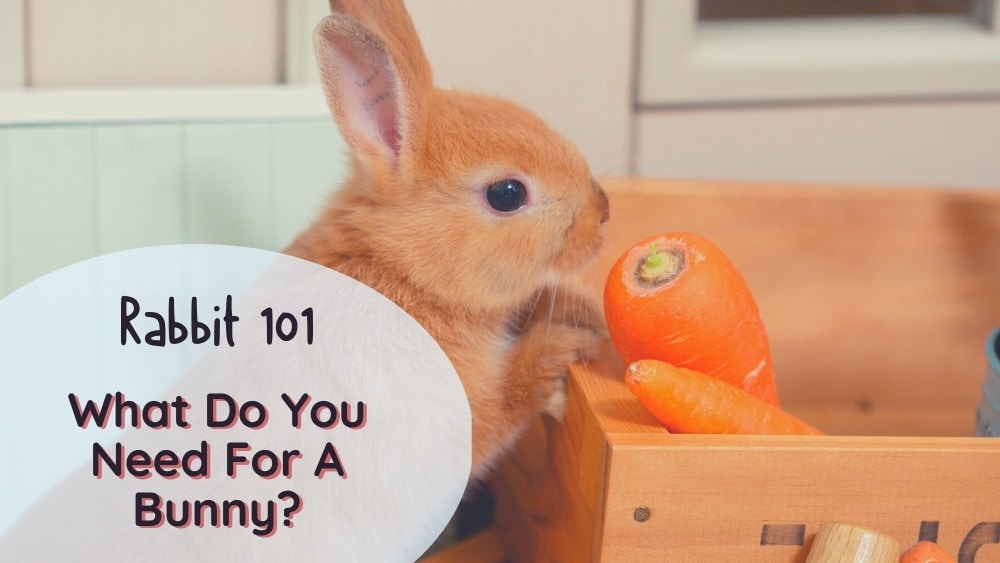If you’ve decided to bring a new rabbit into your life, I’m so happy for you! It’s a wonderful and exciting time. It’s also a big commitment, as rabbits can live for eight to 12 years!
It’s essential to be prepared before you bring your bunny home. Rabbits are intelligent and very active animals, so you’ll need quite a few supplies to create the ideal living environment.
So, what do you need for a bunny? Below is a list of 14 essentials you’ll need before collecting your new best friend.
1. Enclosure
The first thing you need to decide is where your rabbit will live. Ideally, they should live indoors and have as much space as possible.
At a minimum, a rabbit’s enclosure should be three meters by two meters and at least one meter high. This is based on two rabbits living together, as they’re social animals and should ideally have a friend.
There are a few options you can choose from. The most well-known are shop-bought hutches and cages. Keep in mind that these are usually not big enough for a rabbit. If you do choose to go down this route, they’ll need a run attached to their new home, so they have enough space. Cages and hutches range from around $50 to $200, but you need to factor in the price of a run too.
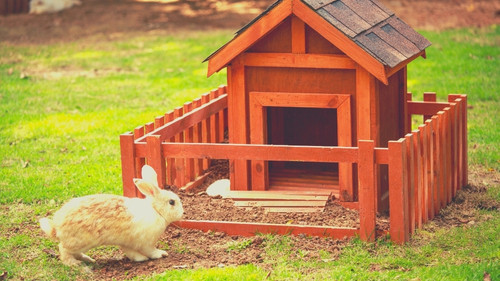
Another option is a pet pen, which is my preferred choice. These come in various sizes; you can even put two or three together to make a bigger area. A quality pet pen averages between $50 and $300. We used a dog pen for my rabbit, as it was sturdy, high enough, and gave him plenty of space.
You could use a whole room for your bunny with a pet gate on the door. Some people let their bunny free roam, meaning they have access to most or all of the house. This is an excellent choice if you have the resources to do so! With these two options, you’ll need to bunny-proof your home well to keep your rabbit safe.
2. Litter Tray and Litter
That’s right, rabbits can be litter trained, and it makes life so much easier! You’ll need a litter tray or box with no top. It should be big enough for your rabbit to sit in comfortably. You can buy corner litter boxes explicitly designed for rabbits, or you can use a cat litter tray. You could even use a shallow storage box as long as it’s plastic and has low enough sides for your rabbit to access comfortably.
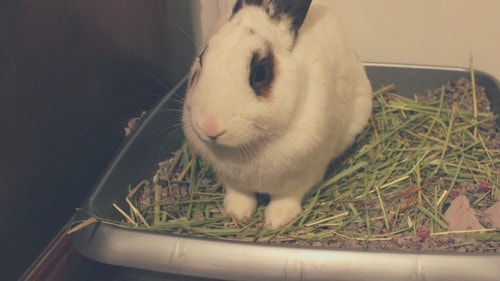
You’ll also need some rabbit-safe litter to put in the litter tray. Paper-based litters are best. Avoid clumping litter or litter made from pine or cedar shavings, as they’re bad for your rabbit’s health.
Litter trays can cost anything up to $30, depending on which size and type you purchase. A decent-sized bag of litter typically costs around $10 to $15.
3. Food Bowl
You’ll need to choose a food bowl to feed your rabbit in. I recommend a heavy ceramic one, as rabbits can be mischievous and are prone to knocking their bowls over if they’re not sturdy. A quality bowl costs between $7 and $20.
4. Water Bowl or Bottle
Your bunny needs constant access to fresh water. Depending on your preferences, you can offer water in a bowl or a bottle. Bowls are a more natural way of drinking for your rabbit, but bottles can be more hygienic. Take your time to decide what’s best for your bunny. Bowls tend to cost under $20, and bottles are usually $10 or less.
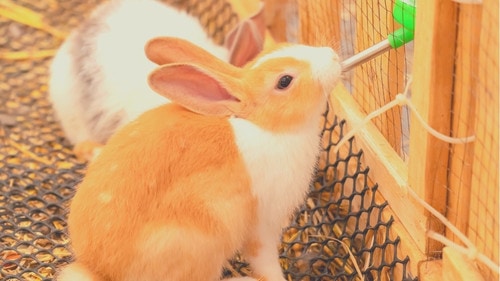
5. Pellets
You’ll need high-quality rabbit pellets or nuggets. You should offer your bunny a small amount of these each day. Pellets that are alfalfa or timothy based are best.
Avoid rabbit ‘muesli’ as your bunny will pick out the bits they like and ignore the rest, so they won’t get a balanced diet.
Quality rabbit food costs around $10 to $20, depending on the size of the bag you purchase.
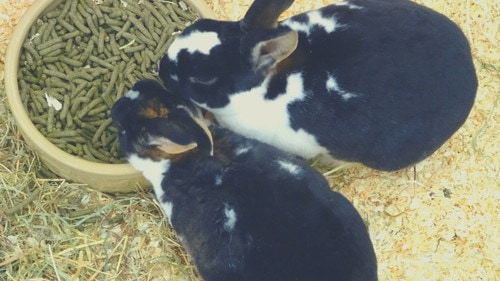
6. Fresh Vegetables
Your rabbit needs fresh, leafy vegetables as part of their regular diet. You can offer a small amount daily or a few times a week. You can find out more in our guide to an ideal rabbit diet.
7. Hay
85% of your rabbit’s diet should be high-quality hay. They should always have unlimited hay on offer as it keeps their digestive system working correctly.
Hay varies significantly in price, starting at around $5 for a small bag and increasing with bigger bags. Since your rabbit will eat a lot of hay, in my experience, it’s better value to buy in bulk.
8. Hay Rack
You can put your rabbit’s hay on the floor in their enclosure, but I find this isn’t as hygienic. Most rabbit owners choose to use a hay rack.
There are many different types on the market, so have a look around and see what you prefer. On average, hay racks cost $10 to $15.
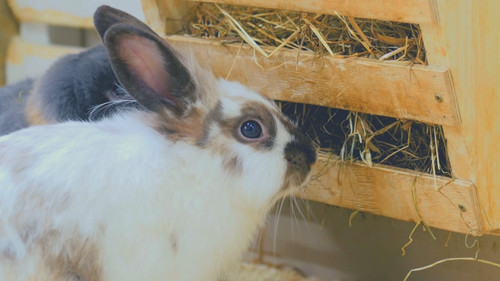
9. Toys
Rabbits are very smart, so you must keep them mentally stimulated. Otherwise, they’ll get bored and can become destructive. There are lots of different toys on the market for your bunnies, so have fun and choose a variety!
Chew toys are a great option as they also help to wear your rabbit’s teeth down and allow them to exhibit natural behavior. Rabbit toys can cost between $3 and $20.
10. Shelter
Bunnies are prey animals and in the wild they naturally live underground in warrens, so they must have access to a shelter to make them feel safe.
You can buy lots of different types of shelters, from wood to plastic in all sizes and shapes. I prefer wood or edible shelters because they’re safe for bunnies to chew and help to wear down their teeth.
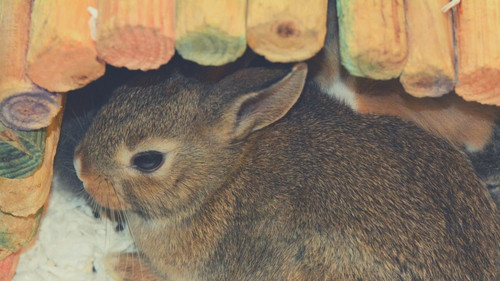
Shelters range in price from $10 to $100. However, you can just use cardboard boxes with a door cut into the side if you’re on a budget. Remember that you’ll need to replace the box when your rabbit chewed holes through it.
11. Rabbit-Safe Cleaning Supplies
You’ll need a scoop to clean your rabbit’s litter tray daily. Most litter scoops work, and they tend to cost under $3. You’ll also need a rabbit-safe cleaner to regularly clean their litter tray and enclosure.
You can buy a safe cleaner for around $6 to $8. Alternatively, many owners prefer to use a simple mix of water and white vinegar. You’ll also want a broom and dustpan to clean up hay and other mess when needed.
12. Grooming Supplies
Grooming your bunny regularly is essential to keep their coat free of mats and ensure they stay healthy.
Depending on the rabbit breed you own, you’ll need a range of grooming supplies. Basics include:
- A small brush
- A grooming comb
- Nail clippers
- Grooming scissors (especially if your rabbit is a long-haired breed)
- Styptic powder (stops bleeding if you accidentally cut too much of your rabbit’s nail)
Most of these grooming supplies cost under $15 each, depending on where you purchase them.
13. Medical Supplies
Having some basic bunny medical supplies in your home is a good idea so you’re prepared if your rabbit becomes injured or unwell. You should always consult a vet, but these can be useful in the meantime.
You can buy a range of supplies, such as small animal antiseptic spray, gauze or bandages, and a veterinary-approved eye wash. I always like to have some of Oxbow’s Critical Care on hand, which is a recovery food to help small animals get over an illness.
Some medical supplies can help you to keep an eye on your rabbit’s health. For example, a digital thermometer to check your rabbit’s temperature. Medical supplies will vary in price depending on what you buy and where from.
14. A Carrier
You’ll need a pet carrier so you can easily take your rabbit to the vet. Even if they don’t become unwell, they’ll still need regular checkups and vaccinations.
Carriers range from $20 to $70, so take your time to choose a style you like and make sure it’s big enough for your bunny.
15. Bunny-Proofing Supplies
Even if your bunny lives in an enclosure, they’ll still need lots of time out of their enclosure to explore and interact with you. You’ll need to bunny-proof any areas they’ll have access to.
Bunny-proofing keeps them safe and prevents damage to your home. Items like wire covers or ‘cord tamers’ help to protect any electrical wires from being chewed. You can get kits of these for under $20.
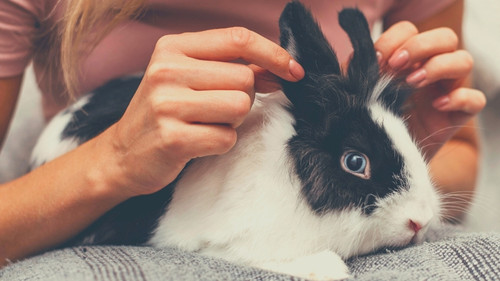
You can move any harmful or precious belongings out of your bunny’s reach. You can also work on training your rabbit not to chew your baseboards or furniture and instead redirect them with safe things to chew on.
Conclusion
Being well-prepared to bring your new friend home sets you up for success. That way, you can ensure your bunny has everything they need and focus on getting to know them.
Did you find this list helpful? Would you add anything to it? We’d love to hear your thoughts in the comments.


